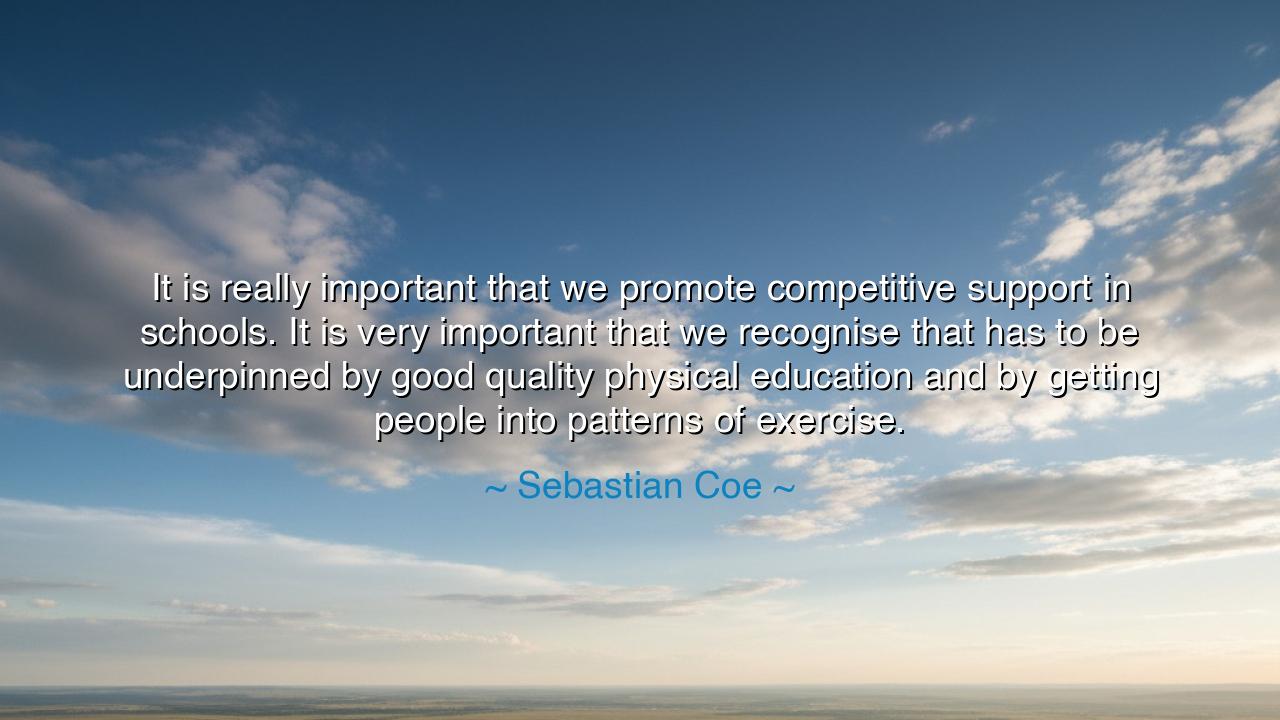
It is really important that we promote competitive support in
It is really important that we promote competitive support in schools. It is very important that we recognise that has to be underpinned by good quality physical education and by getting people into patterns of exercise.






The Olympian and statesman Sebastian Coe, a man who knew both the glory of victory and the discipline behind it, once said: “It is really important that we promote competitive sport in schools. It is very important that we recognise that has to be underpinned by good quality physical education and by getting people into patterns of exercise.” In this statement lies not just the wisdom of an athlete, but the philosophy of a builder of nations. For Coe, sport was never a mere pastime — it was a forge for the human spirit. Through the discipline of the body, the courage of competition, and the rhythm of movement, the young learn lessons that no book alone can teach: perseverance, humility, teamwork, and the joy of striving toward excellence.
In the spirit of the ancients, Coe’s words echo the ideals of the Greek gymnasia, where the education of youth was never separated from the training of the body. To the Greeks, physical education was sacred — for a strong body was seen as the vessel of a virtuous mind. The young were taught not only to think nobly, but to move nobly, to act with grace in both victory and defeat. It was through the wrestling ground, the running track, and the arena that they learned endurance, courage, and self-control — the pillars of character. Coe, in his modern wisdom, calls us back to that same truth: that education without movement becomes sterile, and movement without purpose becomes wild. Together, they create balance — the harmony of body and mind.
As a runner who became a champion of the world, Sebastian Coe understood that competition was not about defeating others, but about surpassing oneself. To promote “competitive sport in schools” is not to encourage rivalry for its own sake, but to awaken in the young the spirit of endeavor — the will to strive beyond comfort, to test one’s limits, and to discover strength in effort. In this, Coe’s teaching is deeply moral. He saw that in every race, there is a mirror — one that reflects our discipline, our integrity, and our courage to rise after we fall. That mirror is education of the truest kind, the kind that forms not just scholars, but citizens.
History too bears witness to the transformative power of sport in shaping human character. Consider the story of Pierre de Coubertin, founder of the modern Olympic Games, who once said that the most important thing is not to win, but to take part — for participation itself cultivates honor and peace. His dream was born from schools, where he saw how physical education could unite youth beyond class, race, or nation. From those playgrounds rose a movement that would later bring together the entire world under the banner of fair play. Coe’s words flow from that same lineage — a belief that good quality physical education is not luxury, but necessity, the soil in which discipline, equality, and respect take root.
Coe also warns us of something deeper — that these lessons must be underpinned by patterns of exercise, by habits that endure beyond school years. For health is not built in a day, nor strength in a single season. The human body, like the human spirit, must be tended daily, kept alive through rhythm, movement, and care. In neglecting this, societies grow weak not only in muscle but in morale. A generation that forgets to move will also forget how to endure. Thus, Coe’s words are a call to vigilance — to build a culture where exercise is not punishment, but celebration; where motion is not a chore, but a prayer to life itself.
His insight is more than athletic; it is civilizational. For when schools nurture the habit of movement, they nurture the health of nations. A youth who learns the discipline of the field will carry it into the discipline of work, of family, of service. Physical education teaches the virtues of effort and order, of balance between ambition and humility. It reminds us that greatness, whether in sport or in life, comes not from talent alone, but from persistence. In this, Coe’s wisdom speaks to all generations: the true victory is not in the trophy, but in the transformation of the soul that strives.
The lesson of Sebastian Coe’s words, therefore, is clear: to educate the body is to fortify the nation. Schools must be the gardens where movement and mind grow together, where competition breeds character, and exercise cultivates joy. Let teachers remember that a classroom without movement breeds fatigue, and a life without discipline breeds decay. Let parents remember that every child who runs, jumps, or plays is learning courage, cooperation, and self-belief.
So let the ancient torch of physical education burn again in our schools and hearts. For as Coe teaches, the strength of a people is not found in their monuments or machines, but in their youth — active in body, alive in spirit, and steadfast in purpose. When the young learn to move with purpose and compete with honor, then a nation, too, learns to rise with grace and endure with glory.






AAdministratorAdministrator
Welcome, honored guests. Please leave a comment, we will respond soon